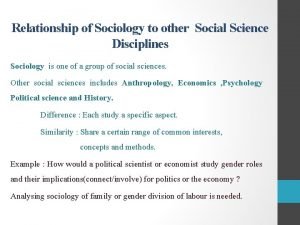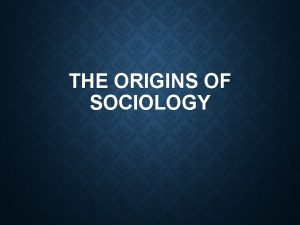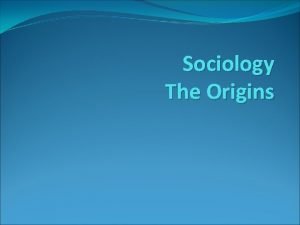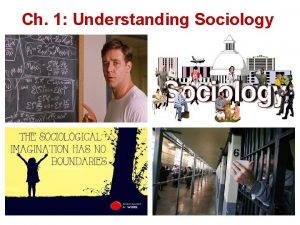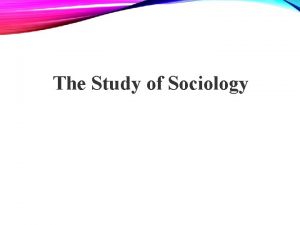The Origins of Sociology is a young science














- Slides: 14

The Origins of Sociology is a young science. It grew out of the writings of European scholars who were interested in bringing back a sense of community to society in the late 1800 s. After World War II, America took the lead in developing the field of sociology. The majority of all sociologists are from the United States. 1

Time Line of Early Sociologists C. Wright Mills publishes 1959 Sociological Imagination Jane Addams awarded 1931 Nobel Peace Prize 1904 Max Weber publishes The Protestant Ethic and the Spirit of Capitalism W. E. B. Du. Bois publishes 1899 The Philadelphia Negro: A Social Study 1897 Emile Durkheim publishes Suicide Herbert Spencer 1850 publishes 1848 Karl Marx publishes The Communist Social Statics Manifesto, promoting a classless society 1838 Auguste Comte’s book, Positive Philosophy, identifies science of sociology 1837 Harriet Martineau publishes Society in America 2 Select a sociologist, by clicking on their name, and view their contributions. .

Name the “giants” who helped to lay the foundation for the discipline of sociology and identify their contribution. Marx Mills Du. Bois Addams Weber Comte Durkheim Spencer Martineau Click on the names to view their contributions. 3 Click the mouse button or press the space bar to display the answer.

Jane Addams – early American sociologist 1860– 1935 social reformer co-founded Hull House in Chicago slums awarded the Nobel Peace Prize, 1931 focused on problems caused by imbalance of power among social classes active in women’s suffrage and peace movements 4

Auguste Comte–early French sociologist 1798– 1857 father of sociology first to advocate the scientific study of society positivism– science based on knowledge of which we can be “positive” distinguished between social stability (statics) and social change (dynamics) 5

W. E. B. Du. Bois–early American sociologist 1868– 1963 African American educator and social activist focused on the question of race inside and outside the United States analyzed social structure of African American communities active in Pan African movement, concerned with rights of all African descendents 6

Emile Durkheim–early French sociologist 1858– 1917 first used statistical methods in study of human groups first to teach university sociology course showed human behavior to be explained by social factors rather than psychological ones 7

Harriet Martineau–early English sociologist 1802– 1876 emphasized sociology as a science translated Comte’s Positive Philosophy introduced feminism into sociology strong and outspoken supporter of both women and slaves 8

Karl Marx–early German sociologist 1818– 1883 guided by principle that social scientists should try to change the world rather than merely study it emphasized the role of class conflict in social change writings were later used as a basis for communism 9

C. Wright Mills–early American sociologist 1917– 1962 called the personal use of sociology “the sociological imagination” first described emergence of strong middle class (White Collar, 1951) published Power Elite, (1956) father of student movement of 1960 s 10

Herbert Spencer–early English sociologist 1820– 1903 early proponent of Social Darwinism opposed social reform; it interfered with process of natural selection compared society to human body; composed of parts working together to promote its well-being 11

Max Weber–early German sociolgist 1864– 1920 developed the concept of verstehen– understanding social behavior by putting yourself in the place of others identified rationalization as key to change from preindustrial to industrial society pioneered techniques to prevent personal biases in research 12

The Origins of Sociology European Origins 13 Auguste Comte developed sociology as the scientific study of society based on positivism, or certain knowledge. Comte studied social stability (social statics) and social change (social dynamics). Herbert Spencer and Karl Marx used sociology to explain the existence of poverty, capitalism, and class struggle. Émile Durkheim applied scientific research methods, such as statistical techniques, to the study of sociology.

The Origins of Sociology in America 14 Jane Addams, who focused on the problems caused by the imbalance of power among the social classes, was an American pioneer in sociology. W. E. B. Du Bois, a prominent African American educator, applied sociology to refute racist policies and assumptions. Booker T. Washington, Robert Ezra Park, and Julian Samora also applied sociology to seek social change for groups lacking in power. George Herbert Mead explored the development of self and laid the foundation for theoretical perspective of symbolic interactionism.
 The origins of sociology
The origins of sociology Jock young sociology
Jock young sociology Geography is my favourite at school
Geography is my favourite at school Is sociology a science essay
Is sociology a science essay Economics and sociology relationship
Economics and sociology relationship Difference between sociology and political science
Difference between sociology and political science Sociology vs political science
Sociology vs political science Relationship between political science and ethics
Relationship between political science and ethics Is sociology a social science
Is sociology a social science Subjective vs objective sociology
Subjective vs objective sociology Hình ảnh bộ gõ cơ thể búng tay
Hình ảnh bộ gõ cơ thể búng tay Ng-html
Ng-html Bổ thể
Bổ thể Tỉ lệ cơ thể trẻ em
Tỉ lệ cơ thể trẻ em Chó sói
Chó sói




